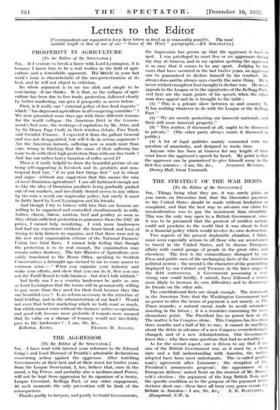THE STRATEGY OF THE WAR DEBTS
[To the Editor of the SPECTATOR.] Sta,—Things being what they are, it was surely plain, as you wrote on December 2nd, that the December payment to the United States should be made without hesitation or complaint, and that the best way to advance our claim for reconsideration was to pay the instalment thus straightly. This was the only way open to a British Government, since it was to be presumed that the greatest of creditor nations could not proclaim to the world that it was about to lead in a financial policy which would involve its own destruction.
Two aspects of the present deplorable situation, I think, must seem especially serious to all those who are accustomed to travel in the United States, and to discuss European affairs with varied groups of people in the great cities and elsewhere. The first is the extraordinary disregard by our Press and public men of the unchanging facts of the American political system ; the second is the character of the generalship displayed by our Cabinet and Treasury in the later stages of the debt controversy. A Government possessing a very strong case could hardly, I submit, have followed a course more likely to increase its own difficulties and to discourage its friends on the other side.
The constitutional facts are simple enough. The statement in the American Note that the Washington Government had no power to alter the -terms of payment is not merely, as The Times remarks, a natural caveat, made to avoid misunder- standing in the future ; it is a reminder concerning the most elementary point. The President has no power here at all. The matter is for Congress alone. This Congress has less than three months and a half of life to run; it cannot do anything about the debts in advance of a new Congress overwhelmingly changed, and of a new Administration. Our Government kriew this : why then raise questions that had no actuality ? As for the second aspect, one is driven to say that if the aim of the British Government was, as it must be, a clean slate and a full understanding with America, the tactiN adopted have been most unfortunate. The to called gentle- man's. agreement after Lausanne ; the reception of the President's armaments proposal ; the appearance of a European debtors' united front on the morrow of Mr. Roose- velt's election ; the argument of the long British Note and the specific condition as to the purpose of the payment in the deeisive short one—these- have all been very grave events ff,r Britain in America.-I am, Sir, &c., S. K. RATCLIFFE. Ilampstead, N.W.






























 Previous page
Previous page